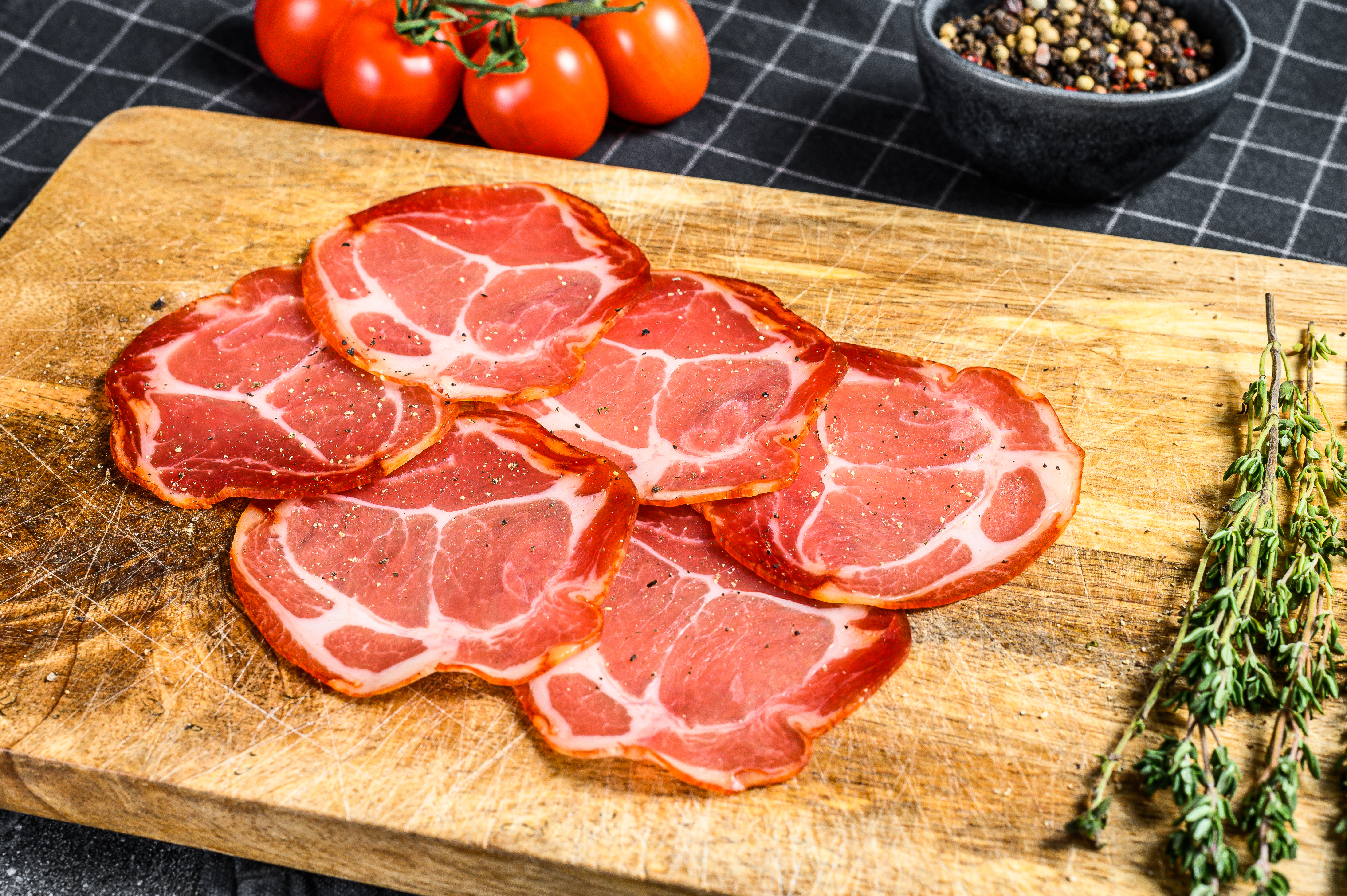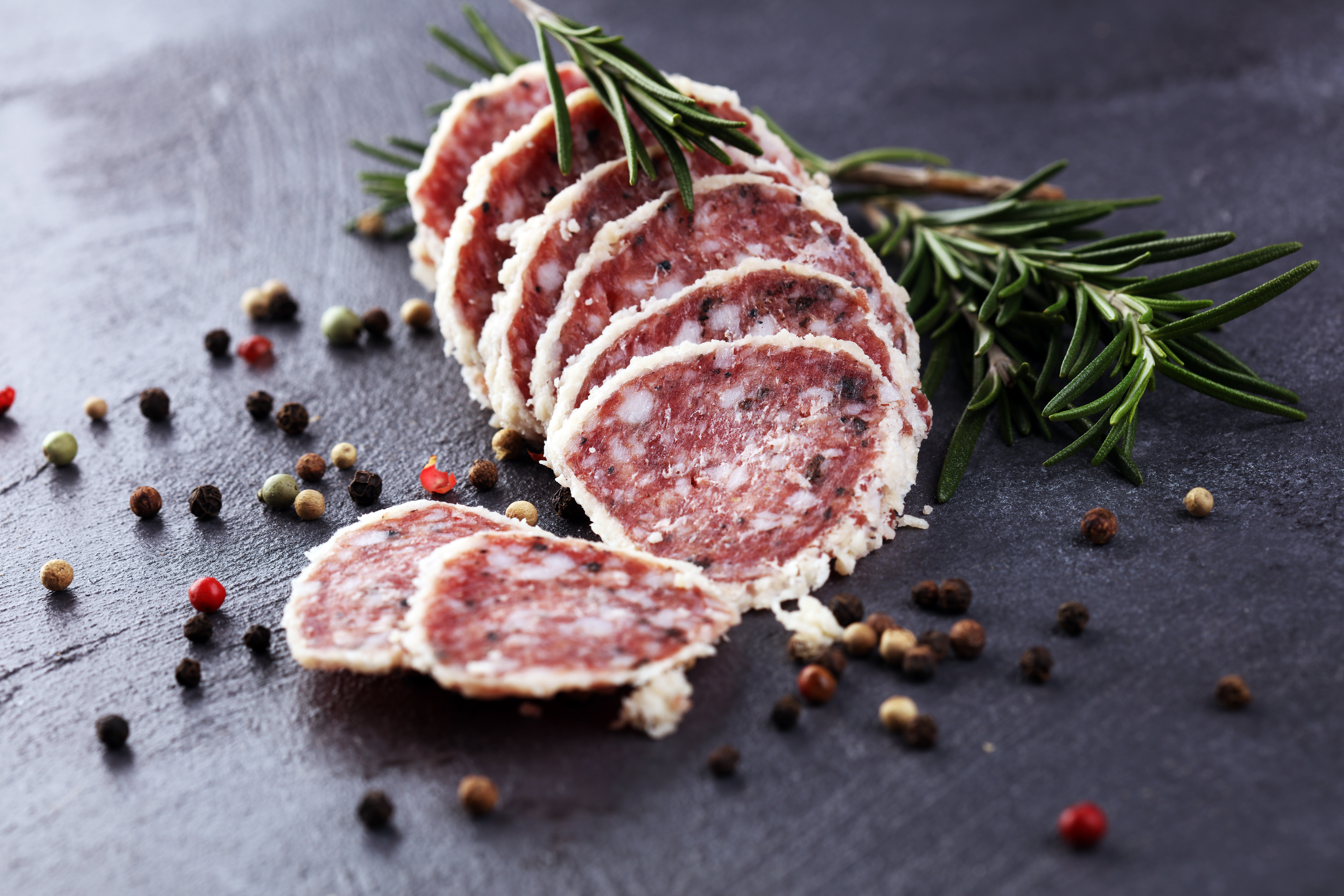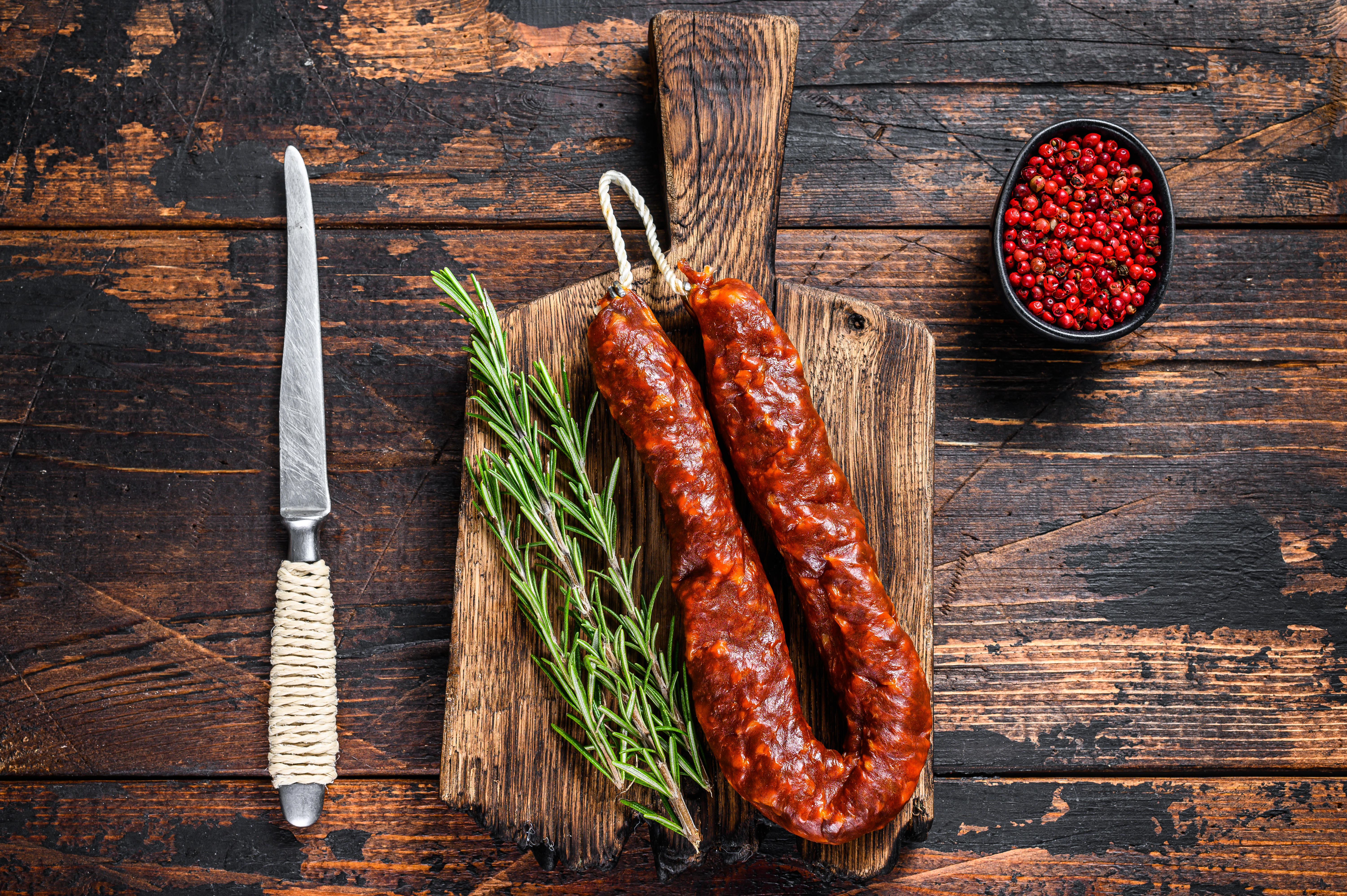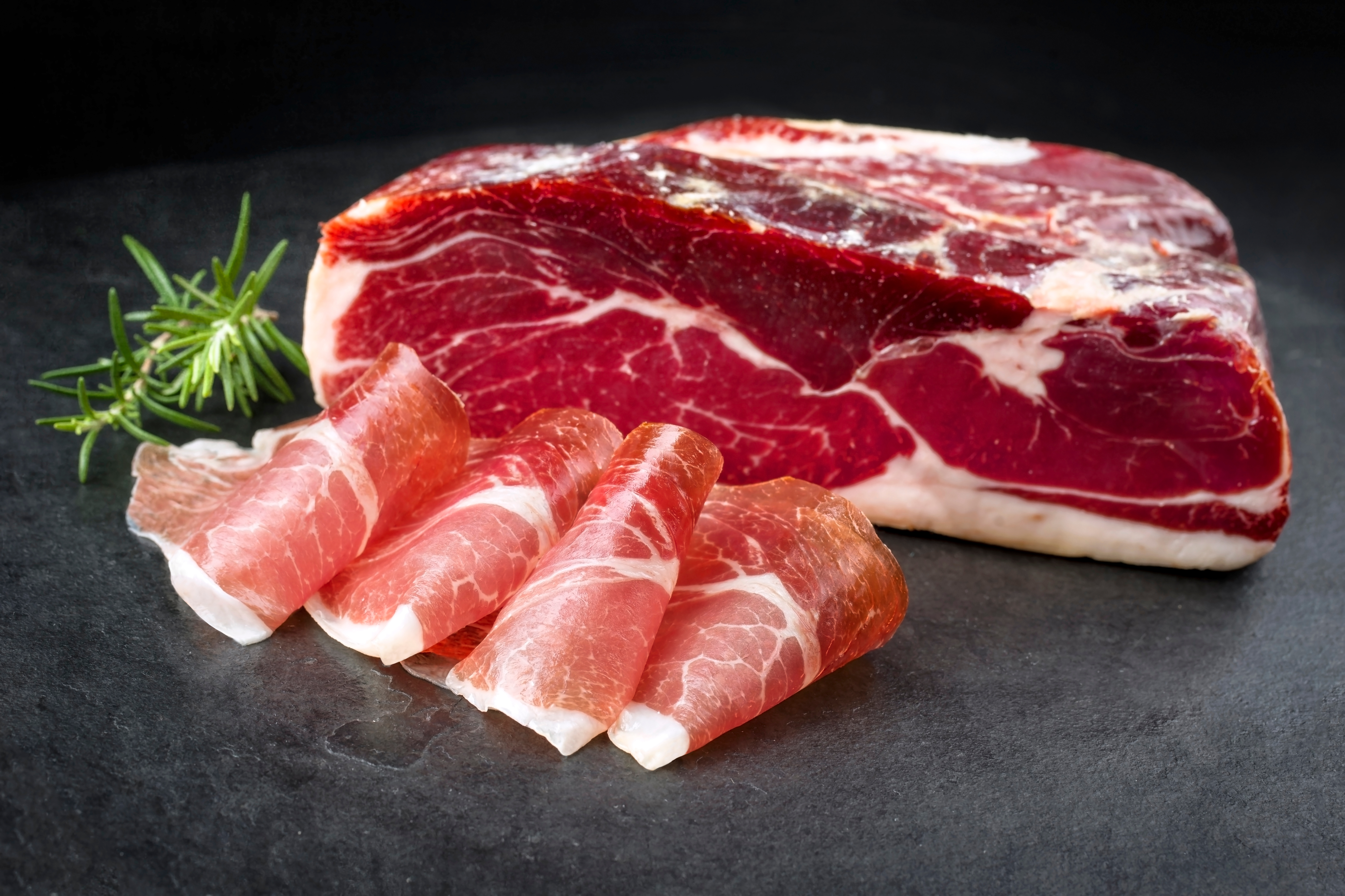Free digital copy
Get Speciality Food magazine delivered to your inbox FREE
Get your free copy
In the charcuterie world there’s the good, the bad, and the downright ugly. The finest cured meats are revered globally. We know the mere thought of a sliver of Bungundy-coloured Jambon Iberico is enough to alight the appetites of foodies. At the other end of the scale are the almost neon pink salamis, churned out quick speed in the thousands – and it’s these that the average consumer will be most familiar with. You’ll find slices neatly nudging up against bunches of grapes, or fashioned into rose shapes (as social media trends dictate) on charcuterie boards not just in the UK, but worldwide, especially in America.

What many shoppers are less clued up on is British charcuterie. Over the last two decades a band of producers, fuelled by passion, have come up through the ranks, bringing to market their take on continental cured meat classics, with a keen eye on animal welfare, and ‘respecting the process’.
Formerly from the food events world, Paul Patterson, founder of The Charcuterie Box Co, which only works with British charcuterie brands, says he fell in love with tapas culture and the art of curing while living in Spain. “And when I started to see British brands trickling onto the scene I was really excited by the fact these people were so obsessed over the welfare of the animals and the quality of the meat. There’s a lot of rubbish out there, charcuterie can be really over processed, but I could see this stuff was worth championing.”
While, compared to other categories, British charcuterie is still regarded as being in its infancy, Paul has more than 50 different types in stock, and says customers are fast gaining knowledge for, and appreciation of, them.
“They’re prepared to pay a premium,” he says, adding that retailers should consider British charcuterie in the same way they regard speciality cheeses. “I’m a cheesemonger. I sell artisan cheese, and I know why it’s expensive. It’s because it’s small scale. It’s a labour of love, with the people behind it working 18 hours a day. And the same can be said for charcuterie. It’s often made by hand, going through a long curing process and maturing for months, whereas a lot of continental cured meats you find in the supermarket are made on an industrial scale. It’s impossible to compete on price, so it’s down to independent retailers to help shoppers understand why they’re paying more for British charcuterie, in the same way they would for an unpasteurised Somerset Cheddar.”

The market has seen strong growth over the last decade says Mark Gallagher, CEO of DukesHill, who adds it’s been thrilling to witness the transformation. “British producers have really come into their own, developing high-quality products that rival traditional continental charcuterie in both flavour and craftsmanship.”
What’s been particularly striking, Mark adds, is the focus on provenance and local, and sustainable farming practices. “As consumers become more interested in where their food comes from and how it’s made, artisan British charcuterie producers have responded with a commitment to ethically sourced meats, traditional techniques and innovative flavour combinations that reflect the British palate,” he says. “This market growth also coincides with the broader movement towards supporting local artisans, which has helped elevate British charcuterie in both domestic and international markets.”
“There is an interest in British charcuterie, and it’s growing,” agrees Dhruv Baker, co-founder of Tempus Charcuterie. “It was almost born out of novelty. When we started in 2016 it was a very very fragmented industry with no real leading producers, and what I’ve noticed over the last two to three years is there seem to be slightly bigger producers emerging – the ones with investment, or that are the result of consolidation - as some others have dropped off.”
Dhruv would like to see British charcuterie get to a point where it can really stick its flag in the sand. “We need to move from being a set of disparate producers, to showcasing British charcuterie on an international stage, making it a ‘thing’ like British cheese. Neal’s Yard have done a great deal in terms of empowering and platforming those producers, now charcuterie makers need to have a more collaborative approach. It’s a creative industry to be proud of,” he continues.

Farshad Kazemian, founder of The Ethical Butcher, echoes Dhruv’s view, that since its inception, British charcuterie has been formed largely of small producers with varying levels of quality and consistency, but says that landscape is changing. “While it’s true that countries like France and Italy have been leading the way for years with their rich traditions and long-established practices, British charcuterie has quickly caught up, carving out its own niche,” he says. “Today, for the first time, we are now seeing the emergence of what I believe to be the future of this industry. Producers with a clear vision, financial security, and a fundamental philosophy based in and around animal welfare and sustainability.”
He nods to makers such as Tempus and Rare & Pasture – owned by The Ethical Butcher’s chairman Andrew Owens MBE. “They are clearly leading the charge, being the Rolls Royce of charcuterie – an embodiment of excellence that prioritises provenance, our health and the health of the planet.”
Since merging, Tempus and Rare & Pasture have become a force to be reckoned with when it comes to sustainability and welfare, and these are the foundation of any good British charcuterie brand, says Dhruv. “It’s not just a catchphrase or greenwashing. Regenerative farming is at the forefront of what we do. Five years ago the idea of regenerative British beef would have been unimaginable. We’re fortunate to have a chairman with a much bigger vision.”
Like Tempus and Rare & Pasture, SaltPig Curing Company has put stock in animal husbandry and higher welfare standards. “The pigs we produce in this country are the best in the world,” says founder Ben Dulley. “By using the best of these British pigs we have the foundations for world class charcuterie. At the core of our business is a whole animal butchery approach. Using as much of the animal as possible, and therefore reducing waste, is an obvious benefit to us all, and should be at the heart of any food business.”
Producers can’t rest on their laurels, assuming just because they’re using premium cuts and ethical produce that the work is done, though. “That has to be at the forefront,” explains Dhruv, “but anything we make has to be as good as our neighbours on the continent. People aren’t buying our products just because they’re British. They have to stand up quality-wise too.”
For Mark, beyond provenance, it’s technique which sets British charcuterie apart “because it combines the best of traditional methods with a distinctly British twist. Producers are drawing from centuries-old techniques while incorporating local ingredients and flavour profiles unique to their region.”
At DukesHill, for example, Mark adds there’s a huge emphasis on own-recipe cures and slow maturation. British charcuterie should “reflect the diversity of our culinary landscape, whether it’s through using native breeds or infusing products with locally sourced ingredients.” This makes it, he says, not just a reflection of great craftsmanship, but a “celebration of the country’s culinary creativity”.
“Being a young industry we have the advantage of building on the knowledge of traditional techniques,” Ben interjects. “Established charcuterie producing countries have handed down recipes for generations. We can use and improve upon these techniques, but are not shackled by tradition.”

At DukesHill Mark has noticed a shift in consumer preferences over the last few years. “More people are seeking out artisan, small-batch products with a strong provenance story behind them,” which plays into the hands of speciality retailers and producers.
Shoppers, Mark continues, want to know that what they’re buying has been crafted by people who care about the impact they’re making on the environment. “There’s also been an increasing interest in more diverse flavours, with consumers willing to try new types of cured meats or unique seasonings.”
At the same time “health-conscious consumers are looking to reduce their intake of mass produced and highly processed foods, and are interested in products with natural ingredients, minimal additives, and traditional curing methods.” They’re also, he says, drawn to the idea of supporting British makers.
In addition to the above, Dhruv says he sometimes kicks himself that he never got into making snacking beef sticks and jerky. “We’ve always wanted to aim, historically, for more classical charcuterie, but I do think animal protein snacking is a growing category. There’s also a huge uptick in pre-sliced charcuterie going into restaurants.” This comes as the hospitality industry faces a surge of ‘deskilling’ due to a shortage of chefs. “Serving air-dried ham with remoulade, or some charcuterie with bread and cornichons is a lot more attainable for businesses that are struggling. We’ve also seen a lot more wet-led pubs showing interest. Places that want to offer snacks above and beyond a packet of nuts or crisps.”
There has been a surge in interest, Dhruv adds, in Tempus’ pastrami too.
“Once a novelty, British charcuterie is now an essential part of a food retailer’s range,” says Ben. “It appeals to customers seeking out products with low food miles and guaranteed provenance, buying from producers who advocate the Slow Food movement and a nose-to-tail ethos. The quality and range are second to none.”
Farshad adds that British charcuterie represents the future of food, meeting the demands of consumers who increasingly value transparency. By stocking these products “retailers are offering a story, a connection to the land, and a taste of the very best that British producers have to offer, whilst helping to regenerate the land.”
For Mark, what makes British charcuterie of value to retailers is that is represents the “cutting edge of quality” in food production. “Additionally, by offering British charcuterie, retailers can differentiate themselves from competitors by showcasing products that aren’t just premium, but are also part of a burgeoning British food renaissance.”
Dhruv’s own thoughts resonate with Mark. It’s the quality that sets these salamis and cured meats apart. They shouldn’t be seen as gap fillers while the price of continental charcuterie imports climbs, but as excellent in their own right. “I want ours in retail because they stand up in blind tastings,” he explains. “Yes, there’s an opportunity for domestic producers, but it can’t be at the detriment to consumers. Any time we go back in terms of selection, choice and availability it’s a bad thing.
“There will be producers rubbing their hands thinking it’s great there’s less of the Italian or Spanish charcuterie coming in, but we need our products to be bought because they deserve to be bought. I see British charcuterie as being a part of the conversation – part of the mix, in the same way a cheeseboard will always have something British and something French or Italian. They’re all delicious options, and we recognise they’re not the same product.”
Dhruv adds retailers should “be more open. There’s more availability than they realise and a lot of producers are better than they might think, and more specialist in terms of what they can offer. I also implore them to try something today. Maybe they’ve tried a lot of British charcuterie five or six years ago, but the world has come a long way since then. They’ll be very surprised by the quality of what they find.”
Tempus Charcuterie, Surrey: Part of the Rare & Pasture family. The brand specialises in using ex-breeding sows and ex-dairy cows which impart a mature, complex flavour to each product. Welfare and sustainability are at the core of the business, which is led by quality and taste. Its latest launch is pastrami, with favourite award winners including the Archari Fennel Salami, combining black pepper with spices used traditionally in an Indian pickling recipe, and the House Salami, flavoured purely with black pepper, fermented for two to three days, and aged for up to three months.
Rare & Pasture, Devon: An award-winning charcuterie and smokehouse in South Devon using organic and Pasture-for-Life certified meat from its own farm and other farms sharing its values. The Black Foot Air-Dried Ham (made from Iberian pork reared in the UK) is stunning, as is the special Beef and Smoked Garlic Salami, crafted using organic, Pasture-for-Life beef from Fowlescombe Farm, Rare & Pasture’s house-smoked garlic, and pork fat.
Cobble Lane Cured, London: A specialist butchery that cures, smokes and hangs meat chosen only from the best British farmers. The charcuterie team have worked with some of the finest in the business in Europe, honing their skills to produce a range that includes Lomo, Bresaola, Soppressata and Nduja.
Marsh Pig, Norfolk: Excellent quality charcuterie, made in Norfolk with pork from high welfare free-range pigs. Only the finest, sinew-free, trimmed leg meat makes it into the brand’s British salami and chorizo, and the makers add just 15% fat – for a denser, meatier finish. Star of the show currently is Marsh Pig’s Black Olive Salami, made with Kalamata olives, a hint of oregano and garlic, and named the best salami in the UK at The World Charcuterie Awards.
Also worth trying is the Venison and Sloe Gin Salami, combining wild British venison with a slug of Norfolk sloe gin.
Suffolk Salami, Suffolk: A truly family-run operation, inspired by French charcutiers, and with all products made with the farm’s own RSPCA-approved, high welfare pork. The Little Oinkers are a real treat, tapping into the protein snacking market perfectly. And the Suffolk Salami with Red Wine and Cracked Black Pepper is a bestseller, slowly matured with spices, peppercorns, garlic and a touch of red wine.
Corndale Farm, Northern Ireland: Cured and air-dried charcuterie made in the stunning Northern Ireland countryside, using the farm’s own higher welfare Saddleback pigs. The Fennel Salami is really quite something, as is the Venison Salami, made using the very best wild venison, their own pork and back fat, garlic and peppercorns.
Sunday Charcuterie, Suffolk: Named for the founders’ love of Sunday night charcuterie boards after clocking off from their former role running a pub in rural North Suffolk. The brand only works with very small farms the team know and trust, and who share their values. Alongside rillettes, terrines, nduja and whole muscle cuts, a standout product is the Salami San Lorenzello, inspired by James’ Italian heritage. Warm and spicy, it’s infused with De La Vera paprika, a touch of cayenne, and toasted fennel seeds.
Somerset Charcuterie, Somerset: A fusion of West Country produce and Italian and Spanish technique, bringing some truly unique, award-winning charcuterie to the table. The brand predominantly uses rare breed Saddleback, Oxford Sandy and Black or Tamworth pigs which are free-range and reared outdoors, enhanced with ingredients sourced from other local producers.
Standout offerings include the Poker snacking salamis (one is flavoured chorizo style and enhanced with cider and Somerset Cheddar), and Peperone – the brand’s take on pepperoni, mixing together its pork, grass-fed beef, and a delicate balance of punchy spices.
And the team are super proud of their Red Wine and Draycott Blue Salami, upgraded from the Poker range to a full-size product due to customer demand. It’s packed with real, fresh blue cheese, which brings a real bite to the salami once fully matured.
Bray Cured, Berkshire: A younger charcuterie company, which began as a hobby and is now found across a number of speciality retailers. Each product is handcrafted and made slowly in small batches, paying attention to every detail. The range includes Air-Dried Ham flavoured with herbs and spices and made with heritage breed British pork, and Hogget Chorizo, which brings a real ‘pow’ to charcuterie boards as well as melting beautifully into sauces, imparting an intense flavour.
Trealy Farm Charcuterie, Monmouthshire: This brand celebrated its 20th anniversary in 2024 and is inspired by the founder’s upbringing on a Sussex smallholding, and visits to his grandmother’s farm in Northern France. All products are allergen and nitrate free, and made using ethically reared British pork and beef, wild boar and venison, free-range duck, and PGI Welsh lamb. Try the Arrotolata – a very traditional Italian-style hand-rolled pancetta, cured with herbs and spices – or the Air-Dried Duck Breast, taking inspiration from the gastronomy of South-West France. Trealy Farm has also tapped into the British love of Mexican food with a Mexican-Style Chipotle Chorizo, filled with fragrant spices and chilli.
Wass Farm Charcuterie, Yorkshire: These makers favour a slightly softer salami style, which really does melt in the mouth. They use their own woodland reared, free-range Mangalitsa and Middle White pork, whose diet consists of whatever they forage in the wild, supplemented with the treat of apple mulch from a nearby cider maker. Try the extremely flavoursome Herbes De Provence Salami and Middle White Coppa.
The Real Cure, Dorset: The multi award-winning maker uses traditional processes to create its salamis and whole cuts, sourcing free-range and wild British meat from higher welfare farms, and constantly innovating in the North Dorset, custom ageing rooms. A fan favourite is the Dorset Nduja, made using British pork and hot Calabrian chillies. Another unique variety to try is the Pink Peppercorn and Purbeck Cider Salami, which is aromatic, with a touch of sweetness.
Wildman Charcuterie & Butchery, Yorkshire: A fifth generation butcher and grazier, using its own rare breed, carefully looked after animals to produce delicious, small batch charcuterie including Cacciatore Salami (a hunter’s-style with red wine, cayenne, garlic, pepper and coriander), and Yorkshire Gin Coppa, cured with repurposed botanicals from the Yorkshire Gin distillery to impart a delicate, floral note.
Hebridean Charcuterie, Scotland: Brian and Melinda are very passionate about the provenance of food, wild ingredients and sustainability, and love sharing a taste of the Outer Hebrides with others. Their Rustic Chorizo is a little bit different, combining free-range mutton and pork, and marrying them with sweet, smoky spices. Continuing on a point of difference is the East to West Salami, made with mutton and a complex Baharat spice mix.
Cornish Charcuterie, Cornwall: Pates, rillettes and cured meats, made on the farm, using some of the brand’s own reared animals, including Cornish Lop pigs.
The ambient jars such as Duck Rillette with Black Cherries and Chicken Liver Pate with Smoky Bacon and Sage Butter, are brilliant for picnic season or tucking into hampers. While from the cured range, the Seaweed & Cider Salami is a bestseller, made to an Italian recipe, and enhanced with hand foraged sea spaghetti and sweet cider.
The Baker’s Pig, Wales: The foodie founders of this business have created an award-winning range of air-dried, fermented and smoked meats, crafted on their farm at the edge of the Brecon Beacons National Park. They share a commitment to using rare breed free-range livestock, while sourcing other ingredients and flavourings from other Welsh businesses wherever possible. The range includes Italian-Style Cacciatore Salami, produced with wild venison from Dinefwf Country Park and Golden Grove, and Speck – an Austrian/Italian-style cold smoked, air-dried ham made without additives, purely cured in salt and black garlic, and hung to mature for up to six months.
East Coast Cured, Scotland: These makers source meat from local farms, cutting, fermenting, smoking, curing and maturing at their workshop in Leith. They dare to do things a bit differently. Think Chorizo and Bourbon – bursting with spice, bourbon and red wine, Cherry Smoked Caraway Kielbasa (a Polish inspired snacking salami smoked over cherry wood), and Porcini and Truffle Salami, bursting at the seams with dried porcini, British white truffle oil and white wine.
Broughgammon Farm, Northern Ireland: A family-run business with an ethical heart. The business, in Country Antrim, started out taking male kid goats from the dairy industry, raising them up on their fields to produce goat meat boxes. Later rose veal, using ex-dairy cows, was added, alongside seasonal wild game. Everything passes through the farm’s on-site butchery and charcuterie facilities. Popular varieties are the tender Rose Veal Coriander Salami (available sliced, and in grab and go or 1kg counter chubs), and Beer Sticks.